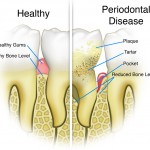
Periodontitis is a very common chronic oral health problem. Management of the condition is primarily via improvements in self-performed oral hygiene and scaling and root planing (SRP). However, for some periodontal conditions a surgical approach is required. As with non-surgical approaches adjunctive local delivered antibiotics have been used, although the evidence is unclear.
The aim of this review was to assess the effectiveness of locally delivered adjunctive antibiotic treatment during periodontal surgery on clinical outcomes.
Methods
The review was registered on the PROSPERO database and searches conducted in the Medline/PubMed, Cochrane Central Register of Controlled Trials (CENTRAL), Scopus, OpenGrey and Google Scholar databases. Randomised controlled trials (RCTs) of locally delivered antibiotics during periodontal flap surgery, treating periodontitis-induced defects were considered. Outcomes included clinical attachment level (CAL) gain, the probing pocket depth (PPD) reduction, the gingival recession depth (RD) changes, bleeding on probing (BOP), gingival index (GI), plaque index (PI) and radiographic changes. Two reviewers independently selected studies, extracted data and assessed study quality using the Cochrane risk of bias tool. Meta-analyses were conducted when two or more studies measured the same outcome. The certainty of the evidence was assessed using he Grading of Recommendations Assessment, Development and Evaluation (GRADE) approach.
Results
- 9 RCTs (2 parallel, 7 split mouth) involving a total of 184 patients were included.
- 3 studies were considered to be at low risk of bias, 5 unclear risk and one a high risk of bias.
- All 9 studies had periodontal conditions with PPD ≥5 mm.
- A range of surgical approaches were used including open flap debridement (OFD), OFD with platelet-rich fibrin, modified Widman flap, guided tissue regeneration (GTR) using membrane, GTR using membrane and bone graft or bone grafts only.
- The most frequently used local antibiotic agent was metronidazole (4 studies) Minocycline (2 studies) and in single studies Doxycycline, Tetracycline, and Moxifloxacin.
- Meta-analyses for various outcome measures are shown in the table below.
| Outcome measures | No of studies | WMD (95%CI) |
| CAL gain ≤6 months | 7 | 0.61 mm (0.07 to 1.14) * |
| CAL gain >6 to 12 months | 5 | 0.41 mm (−0.24 to 1.06) |
| PPD reduction ≤6 months | 7 | 0.41 mm (0.02 to 0.80) * |
| PPD reduction >6 to 12 months | 5 | 0.32 mm (−0.09 to 0.73) |
| RD changes ≤6 months | 2 | 0.16mm (-0.29 to 0.62) |
| RD changes >6 to 12 months | 2 | 0.08mm (-0.62 to 0.78) |
| GI scores ≤6 months | 2 | −0.09 (−0.13 to −0.04) * |
| GI scores >6 to 12 months | 2 | −0.27 (−0.49 to −0.06) * |
| BOP scores ≤6 months | 2 | −28.47% (−33.00 to −23.94) * |
| PI data ≤6 months | 4 | −0.03 (−0.09 to 0.03) |
| PI data >6 to 12 months | 2 | −0.13 (-0.37 to 0.11) |
* Statistically significant
- The overall certainty of the evidence was graded as very low.
Conclusions
The authors concluded: –
…the findings suggest that the application of adjunctive locally delivered antibiotics during surgical periodontal therapy could enhance CAL gain, PPD reduction, and gingival inflammation, especially ≤6 months post-surgically, with minimal if any adverse side effects. Currently, insufficient evidence exists for a clinical recommendation.
Comments
The searches strategy included a number of major databases. However, only 9 small studies were included in this review and of these 7 used a ‘split mouth design which may be subject to a carry-across effect a point noted by the authors. The findings suggested statistically significant findings for some of the outcomes including CAL gain, PPD reduction, and gingival inflammation, especially ≤6 months post-surgically. However, the clinical importance of these improvements is debatable with the recent Cochrane review of systematic antimicrobials as an adjunct to non-surgical periodontal treatment (Dental Elf – 23rd Nov 2020) suggesting that 1mm should be a ‘minimally important clinical difference’ for CAL and PD. The is a need for international agreement on what the clinically important differences are for changes in periodontal outcomes measures. High quality randomised controlled trials of appropriate size that are well reported, (including any adverse effects ) are needed to clarify the best treatment options for periodontitis.
Links
Primary Paper
Yusri S, Elfana A, Elbattawy W, Fawzy El-Sayed KM. Effect of locally delivered adjunctive antibiotics during surgical periodontal therapy: a systematic review and meta-analysis. Clin Oral Investig. 2021 Sep;25(9):5127-5138. doi: 10.1007/s00784-021-04056-7. Epub 2021 Jul 20. PMID: 34283285; PMCID: PMC8370941.
Other references
Dental Elf – 5th May 2021
Chronic periodontitis: Efficacy of adjunctive antimicrobials
Dental Elf – 23rd Nov 2020
Periodontitis: Systemic antimicrobials as an adjunct to non-surgical treatment
